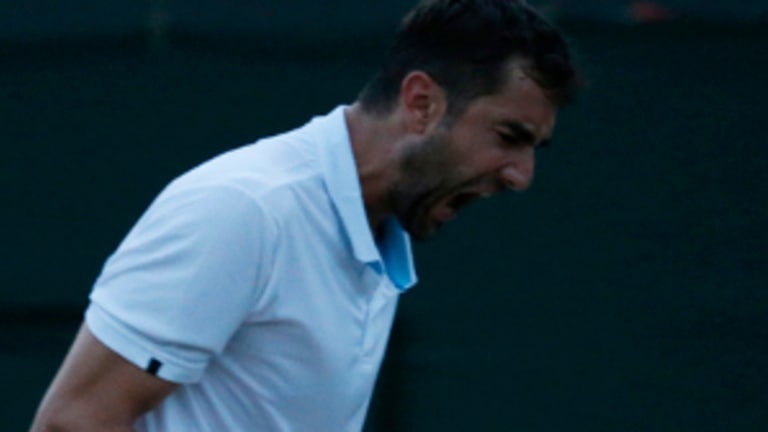To wind up 2014, I’m reposting 14 articles I liked from this past season. I’ll put up one each day until January 5, when the new season begins. At Wimbledon, I wondered how should we feel about the resurgence of two players, Marin Cilic and Barbora Zahlavova Strycova, a year after their doping-related suspensions.
WIMBLEDON, ENGLAND—There have been some notable victory celebrations at The Championships so far. Alizé Cornet’s grass kiss. Grigor Dimitrov’s goal-scoring slide. Rafael Nadal’s raised fist after his win over Lukas Rosol. But perhaps the most heartfelt have come from Barbora Zahlavova Strycova and Marin Cilic. After each of her back-to-back upsets over Li Na and Caroline Wozniacki, Zahlavova Strycova walked off biting her lower lip and grinning from ear to ear. After his post-dusk thumping of Tomas Berdych last week, Cilic leapt and shouted with uncharacteristic abandon.
For both players, these wins have been cathartic, and it's easy to understand why. Last year, Zahlavova Strycova and Cilic each spent time watching from the sidelines while serving doping-related suspensions, suspensions that both players protested. Cilic pulled out of Wimbledon in 2013 to begin a voluntary suspension for testing positive for the banned substance nikethamide; four months later, he would have it reduced to time served when an appeals court agreed that he hadn’t knowingly tried to dope. Zahlavova Strycova tested positive in the fall of 2012 for the stimulant sibutramine and was banned for six months; she maintained that she had ingested the substance through a weight-loss supplement called Berry Thin. She was also found, by the ITF, not to have knowingly tried to enhance her performance. BZS returned last April; Cilic returned in October.
After her win on Monday, Zahlavova Strycova continued her protest, and admitted that she had almost quit tennis while she was away.
“I felt like everything is unfair,” she said. “I was like, ‘I don’t want to be here and see the same people every week.' I was empty.”
It took two months for BZS to get the bug again.
“Then I missed it,” the 28-year-old said. “I missed the feeling of working out, the feeling of winning matches, and being on tour....Then I was, 'Yeah, what I’m going to do?' I really like it. I love the sport.”
Now that her Wimbledon run—BZS has reached the final eight for the first time—has helped put the nightmare of 2013 farther behind her, Zahlavova Strycova says that her time away helped motivate her and put the sport in perspective. It might, it turns out, have been the break that the 12-year veteran needed.
“I like it because I didn’t play for six months,” BZS said, “and it show me also some other stuff. I enjoy much more now. It was tough, but on the other hand, it also brings me some positive things. I’m seeing the sport a little bit different now.”

